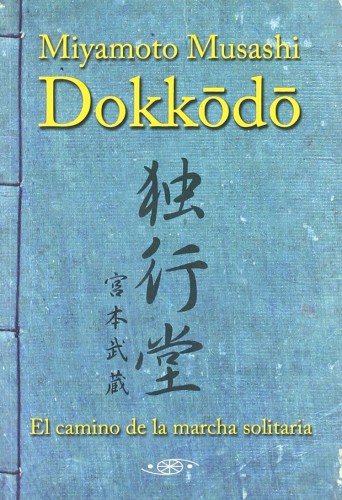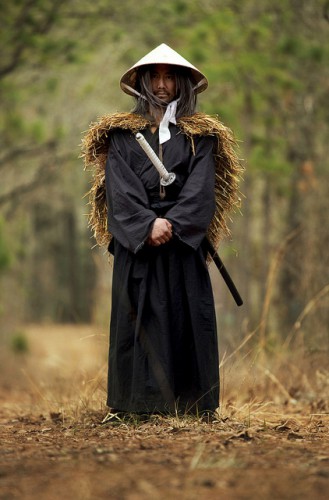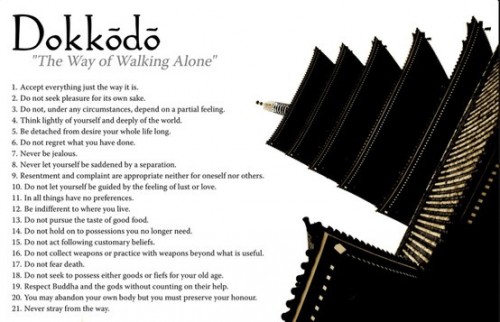Dokkodo (獨行道), roughly translated means “The Path of Walking Alone,” “The Path of Independence,” or “The Lone Path”/ Although the English translation does not give the title much justice, it is should be noted that this refers not to a path of nihilistic abandon, nor a path of misanthropy. Misanthropes who have crossed beyond a certain point will not be able to adhere to it unless they have the discipline and fortitude for it. It is a demanding way and requires that the person choosing the path be able to endure its precepts, including those such as being in the world, without being of it in the sense of being drowned in ‘worldliness.’ Such a concept is paralleled the Christian injunctions that “Whosoever therefore will be a friend of the world is the enemy of God” (James 4:4) and “Denying ungodliness and worldly lusts, we should live soberly, righteously, and godly, in this present world” (Titus 2:12). Similar concepts exist in the Qur’an, namely, “Do not let your wealth or your children distract you from the remembrance of God”. When the “Eastern” Daoist and Buddhist veneers are stripped away, we find something not at all that different from monotheistic teachings. It is worth examining this code for relevance to augment understanding of the world.
1. Do not go against the traditions that have been handed down from the generations (世々の道をそむく事なし)
The first principle is a bit difficult to translate directly into English. The phrase 世々 (yoyo) refers roughly to “previous generations,” while 道 (michi) refers to “the way”; そむく (somoku) means “oppose,” and 事なし (kotonashi) is the negation of a verb. It has variously been translated as, “Accept things as they are” or “Do not go against the way of the world”.
In “accepting things as they are,” one is not asked to tolerate evil or be passive, but is in an active mental struggle to realize our true place in the world and how small we are. It is a battle against the ego to accept our mistakes, to bury the past, and live in the now instead of in the future. Often things we resist are in the past: not accepting that someone has died or being angry over events that have occurred previously. These are things we simply can not change and that is why it makes no sense to resist what has happened.
By respecting the traditions, one “traverses time from the past to the future”. According to Imai Masayuki, this sentence indicates a man who is independent, yet, acting freely conforms to a truth of human nature.
 2. Do not seek pleasure for its own sake (身にたのしみをたくます)
2. Do not seek pleasure for its own sake (身にたのしみをたくます)
The most direct application here is to refrain from engaging in behavior that gives one temporary satisfaction, without understanding the consequences. For instance, it may be more pleasurable to spend one’s spare time with wine, woman and song, rather than in serious study. In a hedonistic, decadent, narcissistic world one can get easily distracted in the sights and sounds even though temporary. It is important to be aware of how harmful these things can be once they become so imbued into our characters as to become a ‘raison d’etre.’ The addiction to flesh, drink, substances, and even music has been studied and found to be folly. Hence the reasonable parameters imposed by society and The Divine.
3. Do not rely upon any half-hearted prejudices. (よろすに依枯の心なし)
Sometimes, it is necessary to take a step back and make a better assessment of the situation. A true warrior, sage, or gentleman is not impulsive or hot-headed, and should strive to uphold justice in all situations. This also means that in dealing with other people, one does not take sides with a certain party without good reason, nor does he harbor indifference towards others.
4. Think humbly of yourself, but deeply of the world (身をあさく思、世をふかく思ふ)
This means to be humble and to think of one’s superficiality. Musashi is telling us here that one should not overestimate one’s importance in the world. Such a self-centered view is dominated by egocentricity and selfish desires. One must evolve beyond such delusions, but at the same time accept that each person has their own limits.
This can also mean to not take excessive pride in one’s own accomplishments and possessions: Do not think that your entire self-worth is in your job or your possessions, rather than in your character or your good deeds. You are not what you own. This is difficult when people gauge worth with material success; your car is not you, your house is not you, your Rolex is not your soul, Gucci has no dominion over your heart.
5. Be detached from desire your whole life long (一生の間よくしん思わす)
This ties in with the fourth precept. Eliminate the driving need for wanting instead of a want for needing. Then, you will have less fear and be unfettered by worldly cares. If you are removed from your own desires, then it is easier to follow a path of right conduct. Eliminate the lusts for material desires, and one already has enough. The concept of wu wei, or mushin ties into this as your lack of hindrances like too much fear in an endeavor will give you success.
6. Do not regret your past (我事におゐて後悔をせす)
There are times when one has to make decisions. Decisions, even if weighed carefully, are not always successful. However, if you tried your best, and you put your best efforts into achieving the right outcome, that is good enough. Of course, this does not apply to someone who is reckless and stubborn. However, those who have the right intent need not dwell on the past that they cannot fix. Instead repent, move on, and become better.
7. Never have bad intentions or envy in your heart (善惡に他をねたむ心なし)
Jealousy clouds the heart with envy; envy poisons the mind with anger and despair. What seems to be someone else’s treasure may be a great burden. With selfish desires in the heart, we cannot truly live a fulfilling life or be at peace with ourselves or others. That lifestyle of those you envy may earn them an early death and debts for generations. It is nothing to be jealous about.
8. Never let yourself be saddened by a separation (いつれの道にもわかれをかなします)
According to the Buddha, attachment is the source of all suffering. Meister Eckhart says, “He who would be serene and pure needs but detachment”. Separation can apply to losing a partner, a pet, money, possessions or anything of the sort. Things will come and go. People will enter and leave. Let them go. The Divine will is going to decide who is going to be with whom and how.
 9. Complaining and bearing grudges are appropriate neither for oneself or others (自他共にうらみかこつ心なし)
9. Complaining and bearing grudges are appropriate neither for oneself or others (自他共にうらみかこつ心なし)
Our selfish desires may lead us to complain about others. For instance, if a person is unsatisfied with another person, he may spread rumors or complain about the other behind his back. He may also hold a grudge against such a person. This is not the behavior of a wise person. Deal with it, it will make you stronger.
10. Do not let yourself be guided by the feeling of lust or love (れんほの道思ひよるこゝろなし)
In the context of Buddhism, In Buddhism there are five different kinds of desires based on desire for money, lust, appetite, desire for fame, desire for sleep. Out of these, lust, being a biological drive, is very hard to avoid. Control yourself and use logical thought when going down that path. To be at the whim of emotion is to be a slave and then to be attached to most temporary of material possessions: a mortal body. It will not even withstand the wind like the mountain, or show the same splendor for aeons like the stars. These too are material objects which will have their death as The Giver and Taker ordains.
11. In all things, have no preferences (物毎にすきこのむ事なし)
Again, this does not mean to become a nihilist. On the contrary, it means to not be obsessed over small and inconsequential matters. Do not be driven or guided by what you cannot control.
12. Be indifferent to where you live (私宅におゐてのそむ心なし)
Where you live is not a matter of importance when you follow this way. As you are already trying to depart from these cares, you should be able to be steadfast and thrive anywhere.
13. Do not pursue the taste of luxurious food (身ひとつに美食をこのます)
The purpose of eating is to nourish oneself. Luxurious food does not accomplish this any better than simple food. In his life, Musashi was a warrior who at times faced levels of extreme privation. However, in the worldview of the bushi, life itself is preparation for war. Avoiding that which is unnecessary is better than indulging in it.
14. Do not become attached to old possessions you no longer need (末々代物なる古き道具を所持せす)
Nothing in the world remains ours forever. Upon death, one’s personal items typically become the property of another. Removing clutter from your life with generosity allows you to live a more unhindered existence and also be aware that you need little. You came into the world with nothing, you travel lightly in the world, and you will leave it with nothing.
15. Do not act following customary beliefs (わか身にいたり物いみする事なし)
Although this seems to contradict the first principle, all this is saying is that there are times in which what is popular will not always be right. For instance, what use is it to worship celebrities, to bury oneself in pursuit of that extolled? It just wastes time and time is what you will never have enough of. Walk the way and live guided by what is ever-enduring. It will be there after this society has faded into the sands of history.
16. Do not collect weapons or practice with weapons beyond what is useful (兵具は格別よの道具たしなます)
What is the utility of engaging in hours practicing or acquiring that which you do not need? For the warrior, weapons are not merely possessions to be owned and collected in the same manner that a merchant may collect trinkets. Today we may not need swords, but instead must use other objects for defense of person, loved ones, and property. Are these tools, worth much pursuit?
17. Don’t spend your entire life being preoccupied with death (道におゐてハ 死を いとわす 思ふ)
Death will happen just as you have been born. As a warrior, to live without the fear of death is paramount. For a sage or scholar, one who lives a proper life and death does not need to fear death. For someone who has lived properly, physical death is not an end, but the hand which will lift the veil of life separating him from The Compassionate Sustainer. Death is as natural as life; life indeed by its nature is the purchase of death. What is better? To depart with a good record, or choose a legacy of iniquity?
18. Do not seek to possess either goods or fiefs for your old age (老身に財寳所領もちゆる心なし)
Millions try to save up all their lives for their dreams: to retire wealthy, to have fun, to own a house of their own. Usually this money goes instead for their care as the world of work has taken its toll. Have no illusions.
19. Revere the Divine but do not demand assistance (佛神は貴し佛神をたのます)
Although this can be viewed as an atheistic sentiment, it can also be interpreted to mean not to be arrogant in the face of the Divine, by demanding certain things. One should not have the illusion that one’s own desires are a manifestation of the divine will. As that immortal essence which transcends everything, God in its own driving of the greater forces which become the laws of reality will determine the necessity of your supplications. The Divine decides everything and has the best answer for particular petitions. Nevertheless, without reverence and sincerity, one cannot be in harmony with the Godhead. Regardless of what is given, it is duty of the believer to believe in, love, and worship.
20. You may discard your own body, but you must preserve your honour (身を捨ても名利はすてす)
There are worse things than dying. There are situations when dying is the most noble and preferable action to take.
21. Never abandon the Eternal Way (常に兵法の道をはなれす)
The purpose of the Dokkodo is to bring out a form of active asceticism – the warrior’s asceticism of action, as Evola would have put it. Whatever happens, stay on the path: when the purpose become enlightenment, the Way becomes of paramount of importance.
Regardless of the external trappings of culture and the differences made manifest in it, there are universal ideals and beliefs within religious and martial traditions. These doctrines give a sense of civility, sophistication, moral understanding, and examples to people and nations who are flawed. Being flawed is the nature of the human being. Flawed beings are always in need of Divine Guidance and its implementation. As above, so below.







 del.icio.us
del.icio.us
 Digg
Digg

